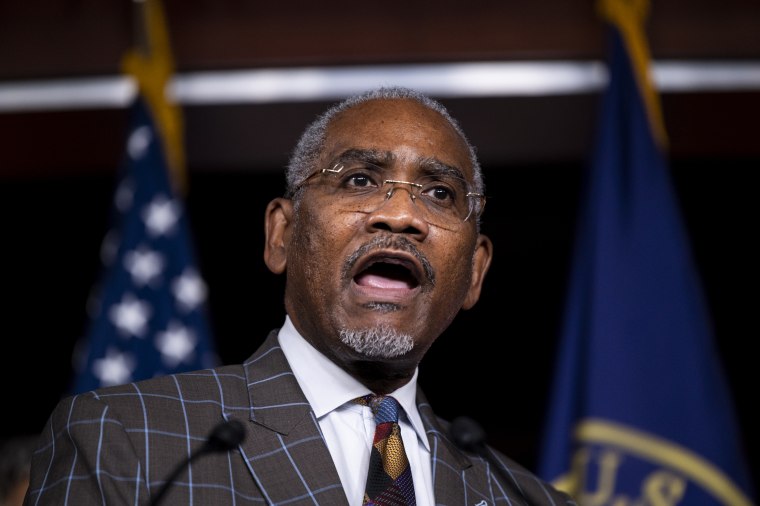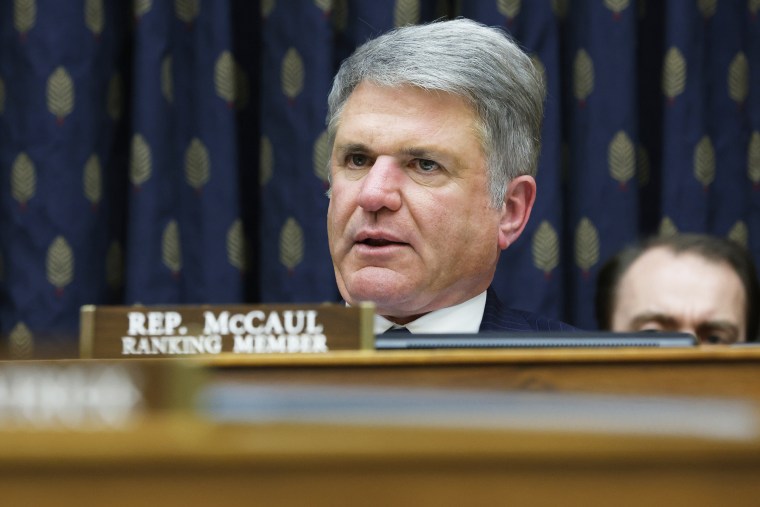WASHINGTON — Speaker Nancy Pelosi, D-Calif., has invited a small group of lawmakers on her official trip to Taiwan, including the top Democrat and Republican on the House Foreign Affairs Committee, Rep. Michael McCaul, R-Texas, told NBC News on Wednesday.
McCaul, the ranking member on the foreign affairs panel, said both he and Chairman Gregory Meeks, D-N.Y., have been invited by the speaker on an upcoming trip to the self-ruling island that China sees as under its control.
McCaul’s comments are the first on-the-record remarks confirming Pelosi’s trip to Taiwan. Her spokesman has declined to confirm any international travel for the speaker, citing “long-standing security protocols,” and the White House also has not confirmed the trip.
The Texas Republican said he declined the invitation due to a personal obligation that conflicts with the visit. The trip is slated to take place during the congressional August recess, though McCaul did not provide the exact dates.
“Any member that wants to go, should. It shows political deterrence to President Xi," McCaul, a China hawk, said in a brief interview in the Capitol. “But she should also pay attention to the military if it’s going to cause a blowback and escalate things.”
Rep. Anna Eshoo, a close Pelosi ally and fellow Bay Area Democrat, told NBC News on Wednesday that Pelosi also invited her on the Taiwan trip but that she could not attend.
A Meeks spokesperson did not immediately respond to a request for comment.

Reports of Pelosi’s potential visit to Taiwan sparked international headlines and stern warnings from Beijing that it would carry out a “forceful” response if she sets foot on the democratic island.
The trip has also created a rare intraparty rift between Pelosi and President Joe Biden, who told reporters over the weekend that U.S. military officials have told him that such a trip “is not a good idea right now.” Biden is set to hold a phone call with Chinese President Xi Jinping later this week on issues ranging from Taiwan tensions to Russia's invasion of Ukraine.
Lawmakers from both parties have rallied behind Pelosi, however, urging her to make the trip and emphasize U.S. support for the democratic island.
“If she wants to go, I certainly think she should go," Sen. Roy Blunt, R-Mo., said Tuesday. "And I think she should be more motivated to go now that she’s been discouraged, and colleagues should join her.”
But some Democrats joined the Biden administration in its concern about the trip. Sen. Chris Murphy, D-Conn., a member of the Foreign Relations Committee, expressed some reservations.
“I think we should be purposeful. If we’re going to change our Taiwan policy, let’s make it a collective decision to do so. Let’s not do it by accident through a series of uncoordinated steps,” he said Tuesday.
In the interview Wednesday in the Capitol, McCaul said he had also spoken to Pentagon and State Department officials who had expressed concerns about Pelosi’s trip to Taiwan.
The U.S. policy toward Taiwan is one of “strategic ambiguity.” Washington does not recognize or advocate for Taiwanese independence from China, but it does sell U.S. weapons and military equipment to Taiwan and does support the island’s ability to send its own delegations to world bodies.
Given recent Chinese aggression toward Taiwan, McCaul said he thinks it’s time for the U.S. to formulate a more robust policy.
“I think it’s gotten to the point where China is such a threat to Taiwan where we need to revisit that policy,” he said. “I don’t think it should be ambiguous anymore. I think China needs to understand that our policy is one to defend and not be ambiguous about it.”

